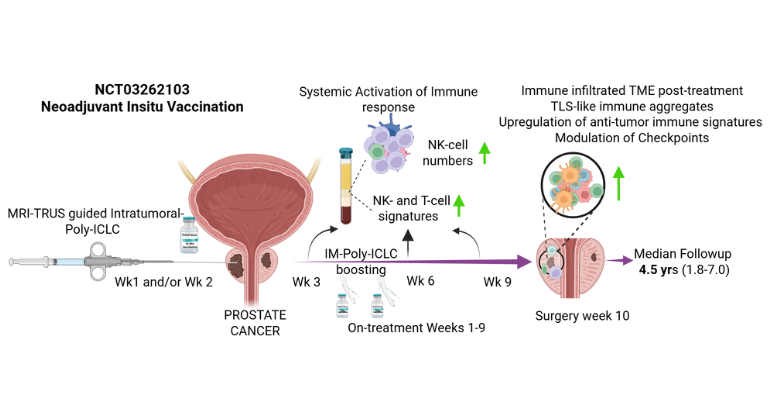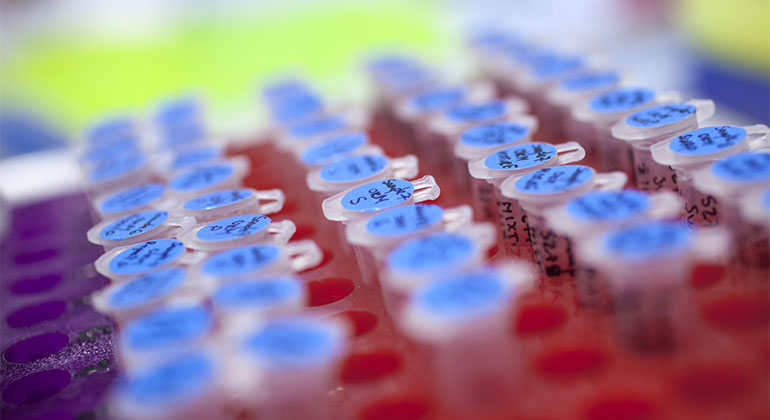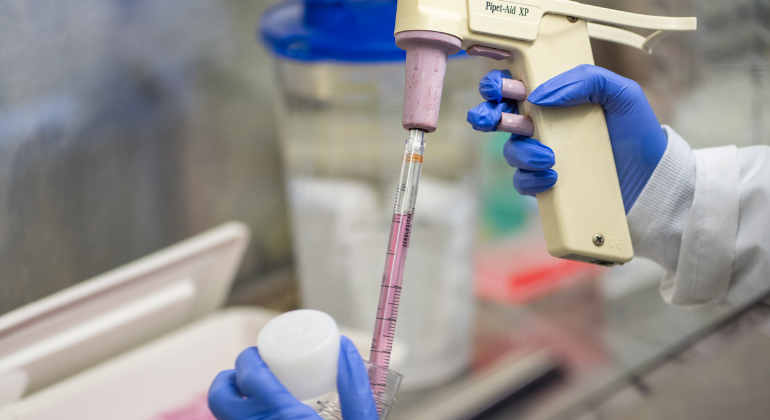Experimental Cancer Therapy Shows Success in More Than 70 Percent of Patients in Global Clinical Trials
Directs patients’ immune system to kill multiple myeloma cells

A new therapy that makes the immune system kill bone marrow cancer cells was successful in as many as 73 percent of patients in two clinical trials, according to researchers from The Tisch Cancer Institute at the Icahn School of Medicine at Mount Sinai.
The therapy, known as a bispecific antibody, binds to both T cells and multiple myeloma cells and directs the T cells—white blood cells that can be enlisted to fight off diseases—to kill multiple myeloma cells. The researchers described this strategy as “bringing your army right to the enemy.”
The success of the off-the-shelf immunotherapy, called talquetamab, was even seen in patients whose cancer was resistant to all approved multiple myeloma therapies. It uses a different target than other approved therapies: a receptor expressed on the surface of cancer cells known as GPRC5D.
Talquetamab was tested in phase 1 and phase 2 trials. The phase 1 trial, which was reported in The New England Journal of Medicine (NEJM), established two recommended doses that were tested in the Phase 2 trial. The results of the Phase 2 trial were reported at the American Society of Hematology annual meeting on Saturday, December 10. The study participants had all been previously treated with at least three different therapies without achieving lasting remission, suggesting talquetamab could offer new hope for patients with hard-to-treat multiple myeloma.
“This means that almost three-quarters of these patients are looking at a new lease on life,” said Ajai Chari, MD, Director of Clinical Research in the Multiple Myeloma Program at The Tisch Cancer Institute and lead author of both studies. “Talquetamab induced a substantial response among patients with heavily pretreated, relapsed, or refractory multiple myeloma, the second-most-common blood cancer. It is the first bispecific agent targeting the protein GPRC5d in multiple myeloma patients.”
Nearly all patients with myeloma who receive standard therapies continually relapse. Patients who relapse or become resistant to all approved multiple myeloma therapies have a poor prognosis, so additional treatments are urgently needed. This study, while an early-phase trial designed to detect tolerability and find a safe dose, is an important step in meeting that need.
This Phase 1 clinical trial enrolled 232 patients at several cancer centers across the world between January 2018 and November 2021. Patients received a variety of doses of the therapy either intravenously or injected under their skin; future studies will focus on doses only administered under the skin either weekly or every other week
The efficacy and safety findings in the phase 1 study were validated in the phase 2 trial presented at ASH. The phase 2 trial included 143 patients treated on a weekly dose and 145 patients treated at a higher biweekly dose.
The overall response rate in these two groups was about 73 percent, Dr. Chari said. The response rate was maintained throughout various subgroups examined, with the exception of patients with a rare form of multiple myeloma that also extends to organs and soft tissues. More than 30 percent of patients in both groups had a complete response (no detection of myeloma-specific markers) or better, and nearly 60 percent had a “very good partial response” or better (indicating the cancer was substantially reduced but not necessarily down to zero).
The median time to a measurable response was approximately 1.2 months in both dosing groups and the median duration of response to date is 9.3 months with weekly dosing. Researchers are continuing to collect data on the duration of response in the group receiving 0.8 mg/kg every other week and for patients in both dosing groups who had a complete response or better.
Side effects were relatively frequent, but typically mild. About three-quarters of patients experienced cytokine release syndrome, which is a constellation of symptoms including fever that is common with immunotherapies. About 60 percent experienced skin-related side effects such as rash, about half reported taste changes, and about half reported nail disorders. The researchers said very few patients (5 to 6 percent) stopped talquetamab treatment because of side effects.
The response rate observed in the study, which Dr. Chari explained is higher than that for most currently accessible therapies, suggests talquetamab could offer a viable option for patients whose myeloma has stopped responding to most available therapies, offering a chance to extend life and benefit from other new and future therapies as they are developed.
These trials were sponsored and funded by Janssen.
About the Mount Sinai Health System
Mount Sinai Health System is one of the largest academic medical systems in the New York metro area, with 48,000 employees working across seven hospitals, more than 400 outpatient practices, more than 600 research and clinical labs, a school of nursing, and a leading school of medicine and graduate education. Mount Sinai advances health for all people, everywhere, by taking on the most complex health care challenges of our time—discovering and applying new scientific learning and knowledge; developing safer, more effective treatments; educating the next generation of medical leaders and innovators; and supporting local communities by delivering high-quality care to all who need it.
Through the integration of its hospitals, labs, and schools, Mount Sinai offers comprehensive health care solutions from birth through geriatrics, leveraging innovative approaches such as artificial intelligence and informatics while keeping patients’ medical and emotional needs at the center of all treatment. The Health System includes approximately 9,000 primary and specialty care physicians and 10 free-standing joint-venture centers throughout the five boroughs of New York City, Westchester, Long Island, and Florida. Hospitals within the System are consistently ranked by Newsweek’s® “The World’s Best Smart Hospitals, Best in State Hospitals, World Best Hospitals and Best Specialty Hospitals” and by U.S. News & World Report's® “Best Hospitals” and “Best Children’s Hospitals.” The Mount Sinai Hospital is on the U.S. News & World Report® “Best Hospitals” Honor Roll for 2025-2026.
For more information, visit https://www.mountsinai.org or find Mount Sinai on Facebook, Instagram, LinkedIn, X, and YouTube.

Early Clinical Trial Tests Immune-Boosting Therapy Before Prostate Cancer Surgery
Oct 30, 2025 View All Press Releases





